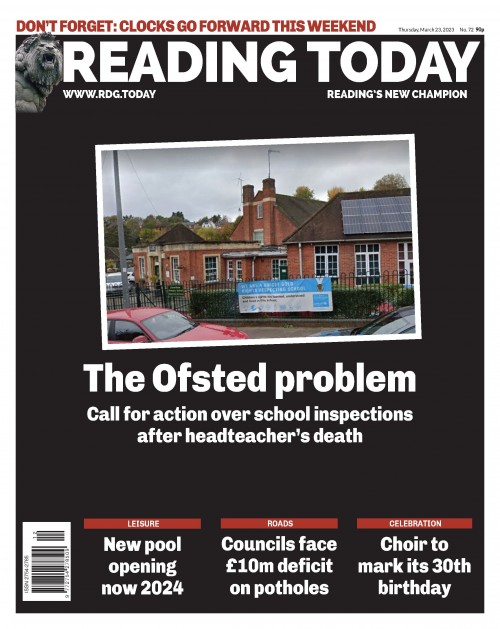A headteacher’s death has prompted a local newspaper to stop covering Ofsted reports on its patch’s schools.
Reading Today has made the pledge after the death of Ruth Perry, who ran Reading’s Caversham Primary School, who took her own life while waiting for the publication of a report that downgraded her school from outstanding to inadequate.
The paper’s vow comes after Ms Perry’s sister Julia Waters called on journalists to stop reporting on Ofsted inspections – and for schools to refuse inspectors entry – until improvements to the watchdog were made.
Reading Today splashed on the fresh plea by the family of Ms Perry, who was 53 at the time of her death in January, on Thursday.

Editor Phil Creighton told HTFP: “The death of Ruth Perry has shocked us all. This was a headteacher doing their best to provide a safe, nurturing environment for children, and we mourn with her family and the community.
“Ruth’s sister, Julia Waters, earlier this week called on the media to stop reporting on Ofsted inspections, as part of a number of measures designed to help improve the system.
“Ms Waters called for meaningful actions to be taken to ensure that nothing like this happens again.
“She called for a thorough, independent review of Ofsted to take place, saying there are better, more accurate ways of judging a school’s qualities.
“Working with schools on our patch, we know that they all work hard to try and provide the best education for their pupils.
“A snap Ofsted inspection puts all staff under additional pressure, especially when, as in the case at Caversham Primary, some small moments cause a rating to tumble.
“Pausing coverage of schools’ Ofsted reports, unless there is a compelling reason to do so, is not just a mark of respect, but a backing of Ms Waters’ call for that essential review of Ofsted and how it operates.”
Ofsted chief isnpector Amanda Spielman said: “The sad news about Ruth has led to an understandable outpouring of grief and anger from many people in education. There have been suggestions about refusing to cooperate with inspections, and union calls to halt them entirely.
“I don’t believe that stopping or preventing inspections would be in children’s best interests. Our aim is to raise standards, so that all children get a great education. It is an aim we share with every teacher in every school.
“Inspection plays an important part. Among other things, it looks at what children are being taught, assesses how well behaviour is being taught and managed, and checks that teachers know what to do if children are being abused or harmed.
“We help parents understand how their child’s school is doing and we help schools understand their strengths and areas for improvement. It’s important for that work to continue.
“The broader debate about reforming inspections to remove grades is a legitimate one, but it shouldn’t lose sight of how grades are currently used. They give parents a simple and accessible summary of a school’s strengths and weaknesses.
“They are also now used to guide government decisions about when to intervene in struggling schools. Any changes to the current system would have to meet the needs both of parents and of government.
“The right and proper outcome of Ofsted’s work is a better education system for our children. To that end, we aim to do good as we go – and to make inspections as collaborative and constructive as we can.
“We will keep our focus on how inspections feel for school staff and on how we can further improve the way we work with schools. I am always pleased when we hear from schools that their inspection ‘felt done with, not done to’. That is the kind of feedback I want to hear in every case.
“As teachers, school leaders and inspectors, we all work together in the best interests of children – and I’m sure that principle will frame all discussions about the future of inspection.”





 Follow HTFP on Twitter
Follow HTFP on Twitter